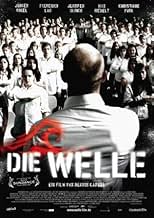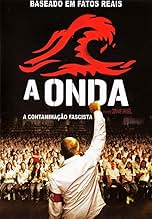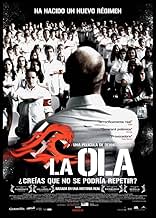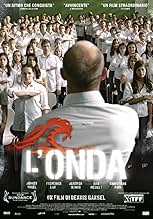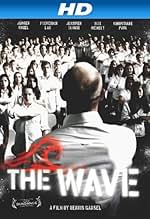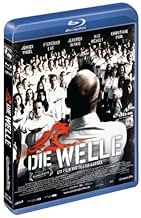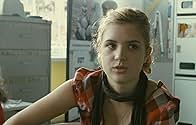A high school teacher's experiment to demonstrate to his students what life is like under a dictatorship spins horribly out of control when he forms a social unit with a life of its own.A high school teacher's experiment to demonstrate to his students what life is like under a dictatorship spins horribly out of control when he forms a social unit with a life of its own.A high school teacher's experiment to demonstrate to his students what life is like under a dictatorship spins horribly out of control when he forms a social unit with a life of its own.
- Awards
- 9 wins & 8 nominations total
7.6120.3K
1
2
3
4
5
6
7
8
9
10
Featured reviews
Fascism is Only A Few Missteps Away
An amiable German social sciences teacher has to teach his children about an autocratic government. The children at first seem bored, not wanting to hear any more about The Third Reich and Nazism. The teacher is surprised. "We're too knowledgeable to ever fall into something like that again," say the students. The teacher then decides to show the children what it's like to live in an autocracy, and sets up a simple experiment in class. They elect a leader (him) and he begins to instill in them (merely as an example) the virtues and practices that accompany an autocracy ("Strength through discipline", "Work as one"). The students take to it, and become obsessed with it. Soon, what was a simple classroom experiment grows to a social entity all it's own, with the teacher not sure if he can reverse the effects.
The film was very well acted and written, and was seriously creepy. It showed how - easily a society could fall into fascism, if presented to the society in the correct way. Watching the film, I understood why the students enjoyed the new system, but was also privy to the horrors that come with it. A shocking and powerful film. The way the different children reacted and how such a seemingly innocent experiment profoundly affected their lives was incredible and horrifying. Vogel gives a powerful performance as an idealistic teacher who isn't aware of the influence he has on others. Worth seeing.
The film was very well acted and written, and was seriously creepy. It showed how - easily a society could fall into fascism, if presented to the society in the correct way. Watching the film, I understood why the students enjoyed the new system, but was also privy to the horrors that come with it. A shocking and powerful film. The way the different children reacted and how such a seemingly innocent experiment profoundly affected their lives was incredible and horrifying. Vogel gives a powerful performance as an idealistic teacher who isn't aware of the influence he has on others. Worth seeing.
Straight forward filming will captivate audiences, along with a pleasing cast.
"Die Welle" is an above average classroom drama with a political voice. Helmed by director Dennis Gansel, film is unforgiving in depicting the youth as a generation without anything to rebel about but loneliness, making them sensitive to any sort of illusion of belonging. Mostly a riveting affair, film lags in its second act as it jumps into Dawson's Creek. Film goes ashore into a memorable finale. Straight forward filming will captivate audiences, along with a pleasing cast.
Project week in a suburban high school entails them to study various forms of government and restriction. Rainer Wenger (Jürgen Vogel), an under-appreciated teacher finds a way in engaging his students. He cleverly manipulates his class to slap them out of apathy and disinterest with tiny minute changes which eventually builds up to a boil. Classroom scenes are stimulating as debates between the students are daring and engrossing writing mention controversial topics that are usually not spoken with lethargy. Film focuses on a group of smart people, highlighting further that what's bound to happen is even more tragic and rings a bell to what can happen out of celluloid..
Inspired by a 1960's social experiment in California documenting how easy it is to influence individuals, film looses track in its middle section as it begins to refocus on the individual lives of the students. Most characters seem to be run in the mill with general high school romance trouble, which would have been interesting but brings nothing new to the table. Stories work better as a collective rather than individuals, which further add to the intended effect. Some personalities shine though: students who never had any sense of belonging are indeed looked at with much heartbreak here as this false sense of security is embraced by them, motivating them to go a step further in preserving the society.
Finale is spellbinding as even if it diverts a lot from the actual experiment, it still proves as a necessity to further establish a point. Film parallels to the effect of Third Reich within its members and climax reminds audiences of the Bruno Ganz header "Der Untergang", as it clearly parallels the extent of loyalties that may arise in such occasions. From the get go, death of a character is imminent and even with its shock value, it justifies itself as beyond a plot device.
As an ensemble, the acting here is impermeable as they all deliver solid performances. Vogel especially convey solid work as the teacher. He brings gravity and his semi-bald haircut proves ominous. It's a shame that audiences lose connection to him midway though as he suddenly becomes the background to the melodrama.
German setting of the movie elevates the film's status. It creates this palpable undercurrent, that even with a country that already identifies itself as guilty; it still cannot escape the possibility of anarchy. Even if the picture becomes stern with its themes, it still is digestible to the mainstream. Word of mouth can secure a life outside the tills.
Project week in a suburban high school entails them to study various forms of government and restriction. Rainer Wenger (Jürgen Vogel), an under-appreciated teacher finds a way in engaging his students. He cleverly manipulates his class to slap them out of apathy and disinterest with tiny minute changes which eventually builds up to a boil. Classroom scenes are stimulating as debates between the students are daring and engrossing writing mention controversial topics that are usually not spoken with lethargy. Film focuses on a group of smart people, highlighting further that what's bound to happen is even more tragic and rings a bell to what can happen out of celluloid..
Inspired by a 1960's social experiment in California documenting how easy it is to influence individuals, film looses track in its middle section as it begins to refocus on the individual lives of the students. Most characters seem to be run in the mill with general high school romance trouble, which would have been interesting but brings nothing new to the table. Stories work better as a collective rather than individuals, which further add to the intended effect. Some personalities shine though: students who never had any sense of belonging are indeed looked at with much heartbreak here as this false sense of security is embraced by them, motivating them to go a step further in preserving the society.
Finale is spellbinding as even if it diverts a lot from the actual experiment, it still proves as a necessity to further establish a point. Film parallels to the effect of Third Reich within its members and climax reminds audiences of the Bruno Ganz header "Der Untergang", as it clearly parallels the extent of loyalties that may arise in such occasions. From the get go, death of a character is imminent and even with its shock value, it justifies itself as beyond a plot device.
As an ensemble, the acting here is impermeable as they all deliver solid performances. Vogel especially convey solid work as the teacher. He brings gravity and his semi-bald haircut proves ominous. It's a shame that audiences lose connection to him midway though as he suddenly becomes the background to the melodrama.
German setting of the movie elevates the film's status. It creates this palpable undercurrent, that even with a country that already identifies itself as guilty; it still cannot escape the possibility of anarchy. Even if the picture becomes stern with its themes, it still is digestible to the mainstream. Word of mouth can secure a life outside the tills.
Fascinating movie about group dynamics
This movie underlines that man is a social creature. We naturally form groups, groups of friends, of people who like the same music etc. Especially when we are young, belonging to a group is important, it makes our identity, who we are -- as opposed to who everyone else is. And so the teacher in the movie uses what is naturally there, to teach his pupils about autocracy. It shows what happens when you stress that identity, when you stress the sameness, and thus also the otherness of those not belonging to the group. Eventually it shows how easy it is for one, for the group to slip, even without being aware of it. Autocracy isn't dead, it is alive and it is easy. This movie is a must see for everyone, but especially for the young.
Good twists / no black & white opinion
This is a German film (subtitled) about a school project looking at autocracy (a la Nazi Germany). In order for the teacher to persuade his pupils that autocracy remains a real threat to democracy, he persuades them to take part in a class dictatorship. The key difference between this and your average school classroom is that he convinces the pupils not just to obey but also to want his every command. Of course the project turns bad and things get scary.
What I liked about the film was that it did not treat the pupils as "just kids"; they had brains, opinions, and their own ethics too. It is not a very black and white in it's opinion, you could draw some distinct opinion from the film but I suggest that there are several different opinions that are equally as valid. It keeps you guessing what is going to happen & even deliberately misleads you.
What I liked about the film was that it did not treat the pupils as "just kids"; they had brains, opinions, and their own ethics too. It is not a very black and white in it's opinion, you could draw some distinct opinion from the film but I suggest that there are several different opinions that are equally as valid. It keeps you guessing what is going to happen & even deliberately misleads you.
A Clever, Ironic Account of Fascist Autocracy
Die Welle (The Wave) is truly a brilliant tale that lures viewers into its cleverly developed plot just as Herr Wenger lures his unsuspecting students into a sense of fascism. When Wenger, an affable schoolteacher who seems to be rebellious towards traditional instruction, gets selected to teach a class on autocracy, he is upset. However, he soon devises a plan with which to teach the students a valuable lesson on the sheer dangers of fascism and the ease with which one can be lured into it.
His class starts out simple and nonthreatening. The students choose Wenger as their leader and are instructed to wear a uniform and create a name for themselves (the students choose Die Welle "The Wave"). But, this club slowly turns into a sort of fascist regime. The unsuspecting students think they are participating in some sort of fun club, but they are really being shown how easily impressionable people can be attracted by autocracy.
The biting irony of this film is that at the beginning of the autocracy class, Wenger touched on the subject of Hitler's reign, and the students almost instinctively spit out answers about how Germany would never fall into that trap again knowing what they know now. But, the children soon eat their words when they become members of a much less disturbing, yet frighteningly similar clique.
There is a glimmer of this fact when two students who aren't members of "The Wave" pick on a student who is. Two other members come to the rescue of the victim. Though many may view this as a positive aspect of this sort of togetherness, the point is that fascism has developed and can easily become corrupt.
I highly recommend this to any potential viewer who either holds the same views as the students at the beginning of the film or simply wants to be entertained by the ironic theme of the film (so long as you don't mind the subtitles).
His class starts out simple and nonthreatening. The students choose Wenger as their leader and are instructed to wear a uniform and create a name for themselves (the students choose Die Welle "The Wave"). But, this club slowly turns into a sort of fascist regime. The unsuspecting students think they are participating in some sort of fun club, but they are really being shown how easily impressionable people can be attracted by autocracy.
The biting irony of this film is that at the beginning of the autocracy class, Wenger touched on the subject of Hitler's reign, and the students almost instinctively spit out answers about how Germany would never fall into that trap again knowing what they know now. But, the children soon eat their words when they become members of a much less disturbing, yet frighteningly similar clique.
There is a glimmer of this fact when two students who aren't members of "The Wave" pick on a student who is. Two other members come to the rescue of the victim. Though many may view this as a positive aspect of this sort of togetherness, the point is that fascism has developed and can easily become corrupt.
I highly recommend this to any potential viewer who either holds the same views as the students at the beginning of the film or simply wants to be entertained by the ironic theme of the film (so long as you don't mind the subtitles).
Did you know
- TriviaBased on the novel "The Wave" by Todd Strasser (under the pen name Morton Rhue), a fictionalized account of the "Third Wave" teaching experiment by Ron Jones that took place in a Cubberley High School history class in Palo Alto, California in April 1967.
- GoofsAlthough set somewhere in western Germany, all policemen wear insignia of the state of Berlin.
- Quotes
Rainer Wenger: So you don't think there could be another dictatorship in Germany?
Jens: No, we are too enlightened now.
- Crazy creditsOpening and closing credits appear as graffiti.
- ConnectionsFeatured in Die Johannes B. Kerner Show: Episode dated 12 March 2008 (2008)
- SoundtracksRock 'n' Roll High School
Written by Joey Ramone, Johnny Ramone and Dee Dee Ramone
Performed by EL*KE
Produced by Mirko Schaffer
©1980 WB Music Corp. and Taco Tunes
- How long is The Wave?Powered by Alexa
Details
Box office
- Budget
- €5,000,000 (estimated)
- Gross worldwide
- $32,350,637
- Runtime
- 1h 47m(107 min)
- Color
- Sound mix
- Aspect ratio
- 2.35 : 1
Contribute to this page
Suggest an edit or add missing content





